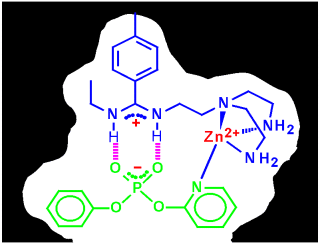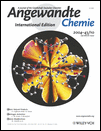Molecularly Imprinted Polymers with Strong Carboxypeptidase A-Like Activity: Combination of an Amidinium Function with a Zinc-Ion Binding Site in Transition-State Imprinted Cavities†
This research was supported by Deutsche Forschungsgemeinschaft and Fonds der Chemischen Industrie. J.-q. Liu acknowledges a fellowship from the Alexander von Humboldt Foundation. Helpful discussions with Prof. Dr. W. Kläui, Institute of Inorganic Chemistry of our university are greatly acknowledged.
Graphical Abstract
Impressing models: A novel polymer catalyst shows even higher catalytic activity for the hydrolysis of carbonates than catalytic antibodies prepared for the same purpose. The catalyst was prepared by molecular imprinting with a stable transition state analogue and the introduction of an amidinium function and a Zn2+ ion in the active site in a defined orientation (see picture).





